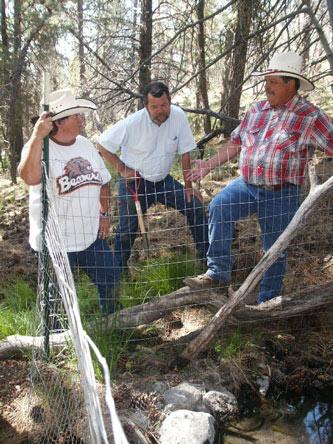|
Rancher aids
watershed
 |
 |
H&N photo
by Steve Kadel
Danette Watson, left, of the OSU
Extension Service and Klamath
Watershed Council, Fish and
Wildlife Service consultant Hugh
Barrett, center, and Sonner
Crume, right, inspect a springs
during a tour of Crume’s Bar S
Ranch on Wednesday. |
|
| |
July 27, 2006
SPRAGUE RIVER - Sonner Crume stopped his
pickup truck near a meadow on his
920-acre Bar S Ranch and hopped out of
the cab.
The lifelong
Klamath County resident showed some
visitors where he and friends used to
camp as children, and the rocky
outcroppings they climbed.
Crume, 53, joked that he's gotten “too
old and fat” for climbing, but his love
of the land remains unchanged.
“This place is
special to me,” he said.
The care he's given the area is
evidenced by lush grass. Not that long
ago, water that now fills 5 acres was
siphoned by juniper trees before it
could reach the meadow.
Junipers removed
Crume removed 30 junipers and changed
the complexion of the site. Water now
flows from three springs that had been
almost dry before.
“This has tripled in flow,” Crume said,
pointing to the springs.
“There's water poppin' out everywhere,”
agreed Hugh Barrett, a consultant hired
by the U.S. Fish and Wildlife Service to
advise Crume and other ranchers about
upland watershed practices.
Barrett
was joined by Danette Watson of the
Oregon State University Extension
Service and the Klamath Watershed
Council. They spent Wednesday morning
touring Crume's ranch to offer
suggestions for his conservation
efforts.
More junipers
targeted
Crume is beginning a juniper removal
project with plans to rid 100 acres of
the ever-expanding species. He hopes it
will result in increased stream flows,
better water quality and improved cattle
grazing.
He drove Barrett and Watson to a butte
where the juniper project will be
focused during the next three years.
Barrett looked around and nodded
knowingly.
“Over 80 years
the juniper has filled in this complete
area and forced everything else out,” he
said.
With coaching from Barrett and Watson,
Crume's game plan calls for seeding the
heavy juniper stands with grass and
small broad-leafed plants before
removing trees.
Logs will be removed, but slash will
remain on the ground. That's to keep the
soil cool, allow nutrients from junipers
to recycle into the earth, and reduce
overland water flow. The branches also
provide protection for seedlings.
Klamath Tribes member
Crume, a
Klamath Tribes member, anticipates some
economic benefit from better grass for
his cattle. But he's just as interested
in watershed enhancement for its
benefits to the ecosystem.
Better habitat is good for fish and
wildlife, especially the deer Crume
prizes. Up to 1,000 deer used to winter
on the property, but they're much fewer
in number now.
“I want to
see them come back,” Crume said. “We've
got to start protecting them. I was born
and raised here. I remember what used to
here, and I want it to come back.
“I want to do my part to help Mother
Nature.”
Better water storage
Watson said the rancher is doing plenty,
and his juniper project can be an
example to other ranchers wanting to
increase water storage in the uplands.
“It's good stuff,” Watson said of
Crume's plan.
Barrett cautioned that ranchers
shouldn't try to get rid of all their
juniper.
Juniper in its place
“This isn't a juniper eradication
campaign,” he said. “This is to get
juniper back to its natural place in
things.”
Barrett visits Klamath County once a
month from spring through fall, with
trips paid for by the U.S. Fish and
Wildlife Service. He was scheduled to
meet with other ranchers today and
Friday to discuss similar enhancement
programs.
“If we can get these watersheds
functioning like they should, the
droughts won't be as frequent or
severe,” he said. “The West by its very
nature is dry, but we've made it more
arid than it needs to be.”
|

